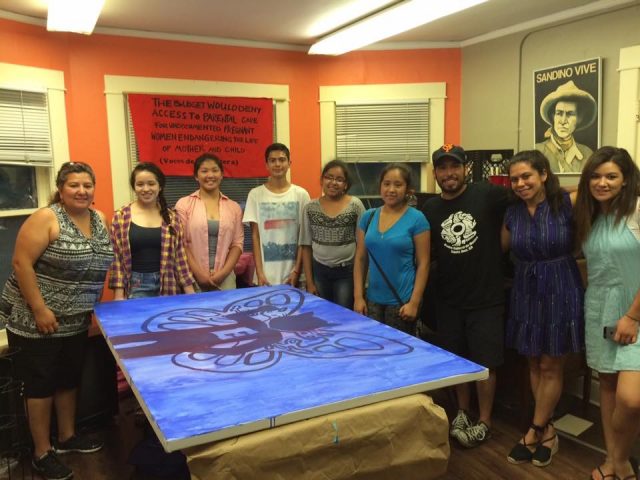 This story was produced by a student in the Madison365 Academy, Madison365’s journalism training program.
This story was produced by a student in the Madison365 Academy, Madison365’s journalism training program.
As she prepared for her senior year of high school, Filipina immigrant and incoming high school senior Diana Theresa Bualong struggled to find a sense a belonging. Bualong was one of the nine students who attended the Xicanx (pronounced Chican-x) Institute for Education and Self-determination at Madison East High School last summer.
 “Attending the institute really helped me find a community that I relate to and am comfortable with,” Diana Theresa Bualong says. “The institute really helped me take pride in my heritage and realize how far my family has come, being part of the minority population in America…I think the institute has brought people of all backgrounds together for a common goal, which is to live together in peace.”
“Attending the institute really helped me find a community that I relate to and am comfortable with,” Diana Theresa Bualong says. “The institute really helped me take pride in my heritage and realize how far my family has come, being part of the minority population in America…I think the institute has brought people of all backgrounds together for a common goal, which is to live together in peace.”
The Xicanx Institute for Education and Self-Determination, which will run for the second time next month, is a two-week-long program to help high school students zero in on developing and forming their own identities as Xicanx students within the U.S.
The institute is the brainchild of Jorge F. Rodriguez, a doctoral candidate in the Department of Curriculum and Instruction within the School of Education at the University of Wisconsin-Madison. Rodriquez comes from an activist background, and is passionate about creating spaces for youth and students in higher education around social justice, self-determination, and cultural resistance. Rodriguez considers himself a scholar activist, constantly looking for ways to interrupt the status quo.
The Institute grows out of negative experiences Rodriguez had in public education — experiences he knows many other Xicanx students have.
Growing up on the south side of Santa Ana, California, one of the poorest regions of the state, Rodriguez recalls a particular devastating memory. “I remember clearly the day when my mother was given the news that I could not go on to fourth grade because I could not do math and read and write correctly,” he says. “My mother was told that the best thing for me was that I repeat third grade so I could be at the same level as other students.”
Nearly thirty years later, after a lot of insecurity, struggles, and liberation around his ability to contribute and be smart, Rodriguez is certain he is academic material. “As an adult and within my discipline in Education, I realized that grading and statistics in performance of third graders directly influence prison incarceration projections,” he says. “If it were not for the courage and self-determination of my non-English-speaking mother to pull me from the school to self teach me all disciplines I was behind in, I would not be where I am at today. I mention these experiences because the birth of my engagement with youth originates from the experiences I acquired while navigating the Santa Ana school system. I am invested in working with our youth because I see myself reflected in their experiences, and I wish to create learning and unlearning spaces where our youth could see themselves reflected. Our youth, like myself, are products of our educational system. If I can re-direct their learning to reflect their lived context, I can guaranty their flourishing, achievement, and success. I wish I had that growing up,” Rodriguez said.
The Xicanx Institute for Education and Self-Determination engages in this process by prioritizing the historical and cultural context of students’ lives, while looking to center civic engagement and critical thinking within a social justice framework. The institute incorporates college-level material used nationally within Ethnic Studies and Xicanx Studies disciplines. The curriculum is designed to be relevant to the culture and lived experiences of the students participating within the institute.
The Institute highlights and critically analyzes the politics of identity, specifically exploring meanings and representations behind social and cultural categorizations such as Hispanic, Latino, Xicanx, Indigenous, Immigrant and their intersections. The institute engages students in history from a critical perspective, utilizing student’s social, cultural, economic and political historical context as sources of knowledge. In the institute, students will have the opportunity to investigate their own historical and political context as it intersects within the concept of an “American Identity”. By participating in the institute through the use of dialogue, narrative storytelling and creative expression, students will further explore and share their individual and collective experiences.
Ethnic studies battles across the country also spurred Rodriguez to action. For example, HB 2281 in Arizona bans schools from teaching classes designed for students of a particular ethnic group. Rodriguez says legislation like that promotes resentment or advocates ethnic solidarity rather than treating pupils as individuals.
“I was appalled as to how a state is able to pass a legislation to outlaw Mexican American Studies and ban books from entering the classroom,” he says. “Within my dissertation I am studying the politics of knowledge and how the U.S. determines knowledge as being ‘official’ or ‘unofficial.’ Often within the history of the U.S. power determines knowledge and what is important for students to learn within the classroom. As historians mention, history is written by the victors, however, what then happens when your herstory and or history falls outside of the victor narrative. The Xicanx Institute for Education and Self Determination (XIES) is our youth’s opportunity to learn of themselves, the political, cultural, social, economic and his/herstorical realities and narratives.”.
This year, the institute will be held on Monday, August 1 through Thursday, August 11 at Madison East High School from 5:00pm to 7:00pm. If interested, students should contact Jorge F. Rodriguez [email protected]. Any and all high students, regardless of race, are welcome to attend.




























